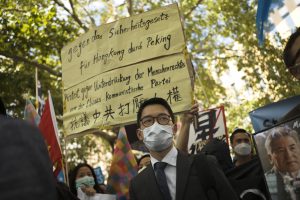From Nathan Law to Ted Hui, a growing number of pro-democracy figures are choosing life overseas amid a widening crackdown at home. Nathan Law, a leading Hong Kong activist-turned-fugitive, was granted political asylum by the United Kingdom last week.
Now living in exile in London, the 27-year-old is a former opposition lawmaker and a founding member of Demosisto, a pro-democracy party that disbanded when Beijing imposed its national security law last summer. He fled the city after the law was passed, in order to continue advocating for Hong Kong democracy.
In August, Law and five other activists – including former British consulate employee Simon Cheng who was also granted asylum by the U.K. – were accused of “inciting secession and collusion” by police, on the grounds of national security.
“The fact that I am wanted under the National Security Law shows that I am exposed to severe political persecution and am unlikely to return to Hong Kong without risk,” Law said in a Twitter post on April 7. “I hope that my case can help the Home Office understand more about the complicated situation in Hong Kong… I hope that every Hongkonger, no matter where you are, is safe.”
Law is among a growing number of Hong Kong activists choosing life in exile overseas, as crackdowns on the pro-democracy movement continue unabated.
Following a massive overhaul of the electoral system earlier this month that expanded the legislative council but severely skewed the odds in favor of the pro-Beijing camp, authorities have taken steps to further weaken political opposition. These include proposing amendments that will criminalize the act of casting blank ballots – a form of voter advocacy – and the redrawing of geographical boundaries for the coming district council elections.
Ted Hui, a 38-year-old former lawmaker who also fled Hong Kong last year and is currently seeking asylum in Australia, told The Diplomat that the recent changes spell an end for democracy and political resistance in the city.
“It clearly shows a total elimination of all dissent no matter how moderate or radical it is,” Hui said. “How uncivilized [it is] to see appointed seats and appointed politicians in a so-called modern city.”
According the Hui, the growing number of overseas exiles plays a crucial role in lobbying foreign governments to take concrete steps in response to the ongoing crackdowns, such as imposing sanctions or reassessing trade relations with Beijing. Last month, Hui, Law, and 22 other activists – 13 of whom are in exile – penned a letter to EU Commission President Ursula von de Leyden urging the EU not to ratify a planned investment treaty with China.
Exiled activists also launched the “2021 Hong Kong Charter” that pledges to continue the pro-democracy movement and conduct international advocacy work “free from partisan politics.” In addition to providing a framework for global advocacy, the charter is also a gesture of solidarity that joins diasporic Hong Kong advocates, Hui said.
“With the 2021 Hong Kong Charter, we shall unite the diasporic communities, to come together at the international front,” the Charter reads. “We vow to stand against the oppression from the Chinese Communist Party, to strive for freedom and democracy in Hong Kong.”

































